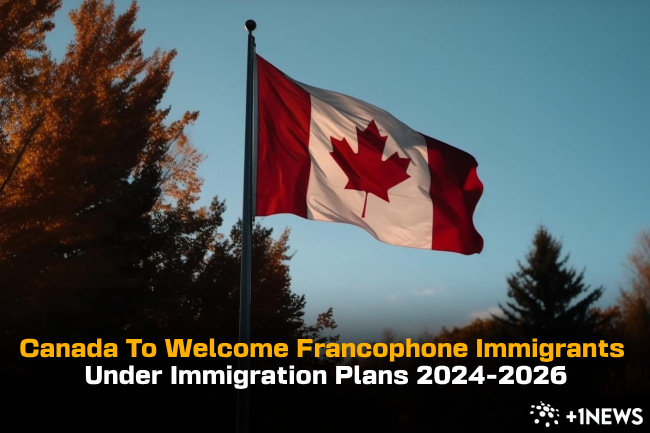Canada Immigration Levels Plan for 2024-2026 outlines a special focus on attracting more Francophone individuals to become permanent residents.
Let’s dive into what this means and why it matters.
Jump to:
Welcoming More French-Speaking Permanent Residents
The Immigration Levels Plan for 2024-2026 has outlined specific targets of 31,500 French-speaking permanent residents in 2025 and an increased intake of 36,000 in 2026.
These targets signify Canada’s broader initiative to diversify its immigrant population by actively inviting French speakers to become permanent residents.
Where Do French-Speaking Immigrants Fit In?
Canada’s Immigration Levels Plan segregates its targets into three main categories: economic, family, and refugee/humanitarian classes.
Notably, within this plan, there is a dedicated emphasis on welcoming French-speaking immigrants outside Quebec, acknowledging Quebec’s unique immigration policies.
Increasing Opportunities for French Speakers Outside Quebec
A notable aspect of this plan is the projected increase of 4,500 admissions for “overall French-speaking Permanent Resident Admissions outside Quebec” from 2025 to 2026.
It’s essential to highlight that Quebec operates under its distinct immigration policies, which differ from the rest of Canada.
Quebec Immigration Targets for 2023-2025
The Quebec Immigration plan aims to admit 39,800 to 45,150 people under its selection authority in 2023. This includes 33,800 to 38,200 qualified workers, 1,100 to 1,500 business immigrants, and up to 100 candidates in the other economic immigration programs.
Economic immigrants are expected to make up 65% of total admissions in 2023.
Here’s a breakdown of the numbers:
Changes Across Immigration Categories
As part of the Immigration Levels Plan, there might be a shift in the “Economic Pilots” category, potentially leading to a decrease in admissions, from 14,750 in 2025 to 13,750 in 2026.
The Economic Pilots category includes three immigration pathways:
- Agri-Food Pilot
- Rural and Northern Immigration Pilot
- Economic Mobility Pathways Project
The Drive Behind Boosting French-Speaking PR Admissions
Canada wants to increase the number of French-speaking Permanent Residents. They’re doing this because of a report called “An Immigration System for Canada’s Future.“
This report, released by IRCC and the Canadian government, talks about what they found out and what they plan to do about a new way for people to immigrate to Canada. They talked to many different groups before making this plan.
In this report, IRCC says they want to make sure that French-speaking minority communities, even those outside Quebec, become more lively and strong.
Canada’s strategic move to boost the intake of French-speaking permanent residents stems from its desire to revitalize and strengthen Francophone minority communities nationwide.
This initiative goes beyond Quebec and forms a crucial part of the country’s new immigration strategy.
IRCC’s Strategic Steps for Francophone Communities
Policy Development:
IRCC (Immigration, Refugees and Citizenship Canada) aims to develop a new Francophone Immigration Policy, focusing on strengthening the demographic weight of Francophone communities across Canada.
Promotion and Selection:
Efforts will intensify to promote and select French-speaking permanent residents, ensuring their integration and settlement within these communities.
Support for Settlement and Integration:
IRCC plans to provide comprehensive support for the settlement and integration of French-speaking immigrants in Francophone minority communities.
Setting Ambitious Targets:
The goal is to set ambitious yet achievable targets to consistently increase the admission of Francophone permanent residents over time.
IRCC’s Strategic Efforts in Action
Immigration Minister Marc Miller has highlighted the importance of Francophone immigration during National Francophone Immigration Week, highlighting the contributions of French-speaking immigrants to Canada’s cultural, demographic, and economic richness.
To support these efforts, Canada is allocating substantial funds:
- Global Promotion: $18.5 million will be invested in promoting Francophone immigration globally, targeting regions such as Africa, Europe, the Middle East, and the Americas.
- Strengthening Integration: An allocation of $50 million aims to reinforce integration pathways and improve settlement facilities for newcomers in Francophone minority communities across Canada.
Enhancing Opportunities for French Speakers in Immigration Programs
Express Entry candidates proficient in French will gain additional Comprehensive Ranking System (CRS) points, enhancing their chances of obtaining Canadian permanent residence during standard draws.
Moreover, a dedicated category-based draw specifically favors candidates with French-language abilities, broadening the avenues for French-speaking immigrants.
Stay Informed with +1 News about Latest Francophone Express Entry Draws
Successes in Francophone Immigration
Canada has already made significant efforts to increase immigration to Francophone minority communities outside Quebec. In 2022, the country successfully met its target by settling 4.4% of French-speaking immigrants in these communities, welcoming over 16,300 new immigrants.














